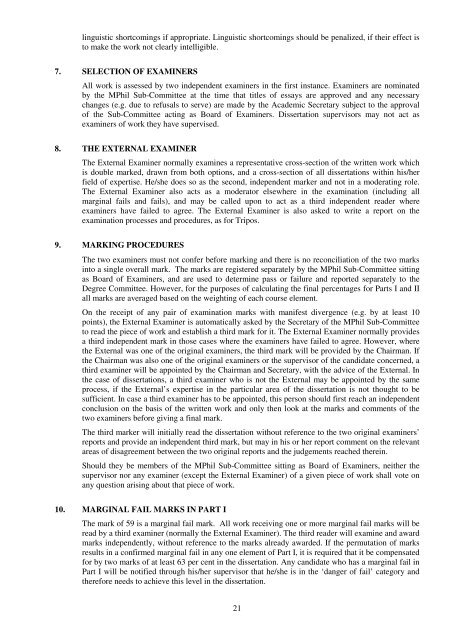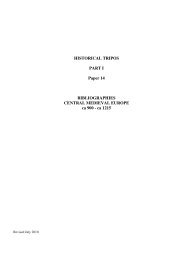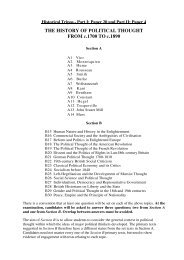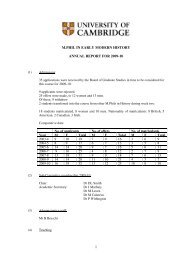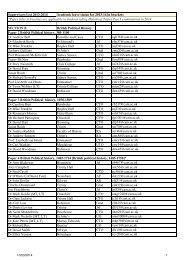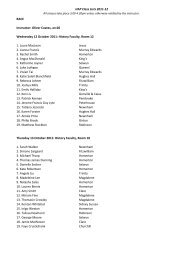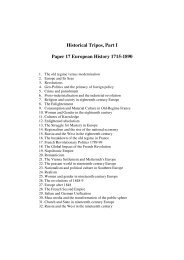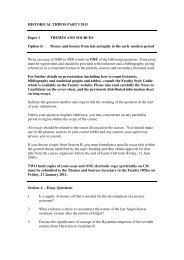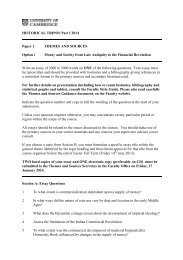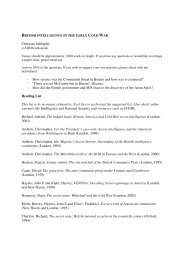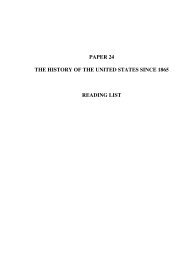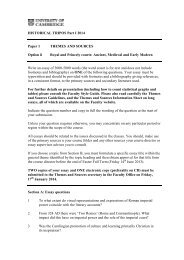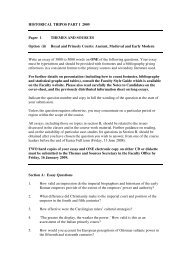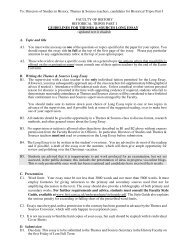Course Handbook - Faculty of History - University of Cambridge
Course Handbook - Faculty of History - University of Cambridge
Course Handbook - Faculty of History - University of Cambridge
Create successful ePaper yourself
Turn your PDF publications into a flip-book with our unique Google optimized e-Paper software.
linguistic shortcomings if appropriate. Linguistic shortcomings should be penalized, if their effect is<br />
to make the work not clearly intelligible.<br />
7. SELECTION OF EXAMINERS<br />
All work is assessed by two independent examiners in the first instance. Examiners are nominated<br />
by the MPhil Sub-Committee at the time that titles <strong>of</strong> essays are approved and any necessary<br />
changes (e.g. due to refusals to serve) are made by the Academic Secretary subject to the approval<br />
<strong>of</strong> the Sub-Committee acting as Board <strong>of</strong> Examiners. Dissertation supervisors may not act as<br />
examiners <strong>of</strong> work they have supervised.<br />
8. THE EXTERNAL EXAMINER<br />
The External Examiner normally examines a representative cross-section <strong>of</strong> the written work which<br />
is double marked, drawn from both options, and a cross-section <strong>of</strong> all dissertations within his/her<br />
field <strong>of</strong> expertise. He/she does so as the second, independent marker and not in a moderating role.<br />
The External Examiner also acts as a moderator elsewhere in the examination (including all<br />
marginal fails and fails), and may be called upon to act as a third independent reader where<br />
examiners have failed to agree. The External Examiner is also asked to write a report on the<br />
examination processes and procedures, as for Tripos.<br />
9. MARKING PROCEDURES<br />
The two examiners must not confer before marking and there is no reconciliation <strong>of</strong> the two marks<br />
into a single overall mark. The marks are registered separately by the MPhil Sub-Committee sitting<br />
as Board <strong>of</strong> Examiners, and are used to determine pass or failure and reported separately to the<br />
Degree Committee. However, for the purposes <strong>of</strong> calculating the final percentages for Parts I and II<br />
all marks are averaged based on the weighting <strong>of</strong> each course element.<br />
On the receipt <strong>of</strong> any pair <strong>of</strong> examination marks with manifest divergence (e.g. by at least 10<br />
points), the External Examiner is automatically asked by the Secretary <strong>of</strong> the MPhil Sub-Committee<br />
to read the piece <strong>of</strong> work and establish a third mark for it. The External Examiner normally provides<br />
a third independent mark in those cases where the examiners have failed to agree. However, where<br />
the External was one <strong>of</strong> the original examiners, the third mark will be provided by the Chairman. If<br />
the Chairman was also one <strong>of</strong> the original examiners or the supervisor <strong>of</strong> the candidate concerned, a<br />
third examiner will be appointed by the Chairman and Secretary, with the advice <strong>of</strong> the External. In<br />
the case <strong>of</strong> dissertations, a third examiner who is not the External may be appointed by the same<br />
process, if the External’s expertise in the particular area <strong>of</strong> the dissertation is not thought to be<br />
sufficient. In case a third examiner has to be appointed, this person should first reach an independent<br />
conclusion on the basis <strong>of</strong> the written work and only then look at the marks and comments <strong>of</strong> the<br />
two examiners before giving a final mark.<br />
The third marker will initially read the dissertation without reference to the two original examiners’<br />
reports and provide an independent third mark, but may in his or her report comment on the relevant<br />
areas <strong>of</strong> disagreement between the two original reports and the judgements reached therein.<br />
Should they be members <strong>of</strong> the MPhil Sub-Committee sitting as Board <strong>of</strong> Examiners, neither the<br />
supervisor nor any examiner (except the External Examiner) <strong>of</strong> a given piece <strong>of</strong> work shall vote on<br />
any question arising about that piece <strong>of</strong> work.<br />
10. MARGINAL FAIL MARKS IN PART I<br />
The mark <strong>of</strong> 59 is a marginal fail mark. All work receiving one or more marginal fail marks will be<br />
read by a third examiner (normally the External Examiner). The third reader will examine and award<br />
marks independently, without reference to the marks already awarded. If the permutation <strong>of</strong> marks<br />
results in a confirmed marginal fail in any one element <strong>of</strong> Part I, it is required that it be compensated<br />
for by two marks <strong>of</strong> at least 63 per cent in the dissertation. Any candidate who has a marginal fail in<br />
Part I will be notified through his/her supervisor that he/she is in the ‘danger <strong>of</strong> fail’ category and<br />
therefore needs to achieve this level in the dissertation.<br />
21


